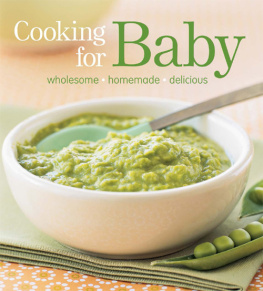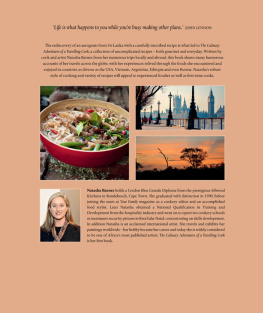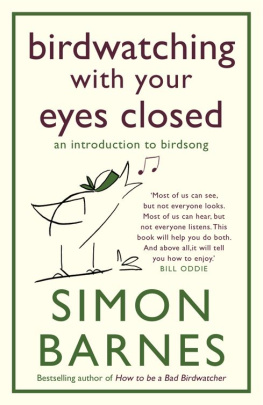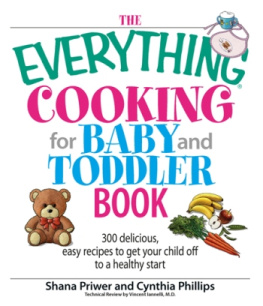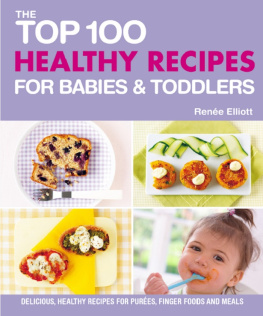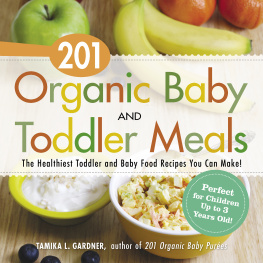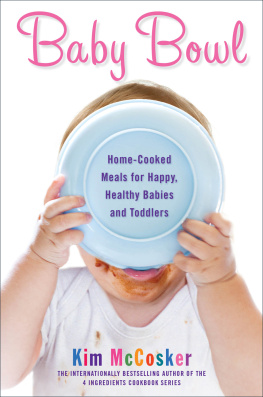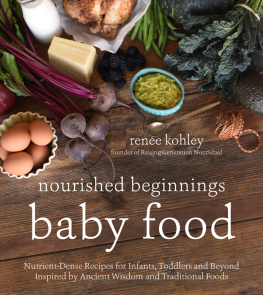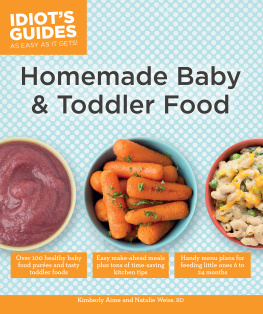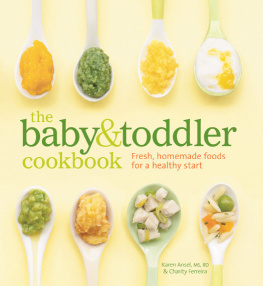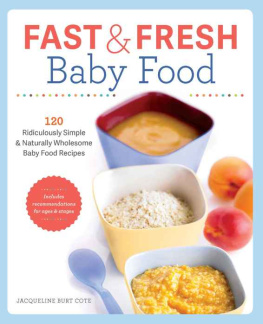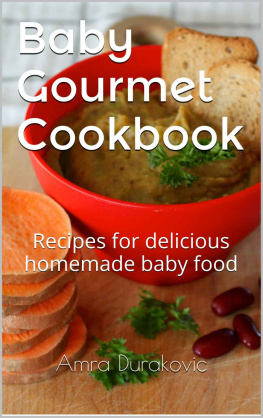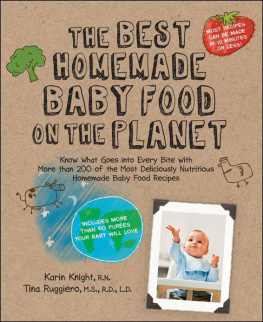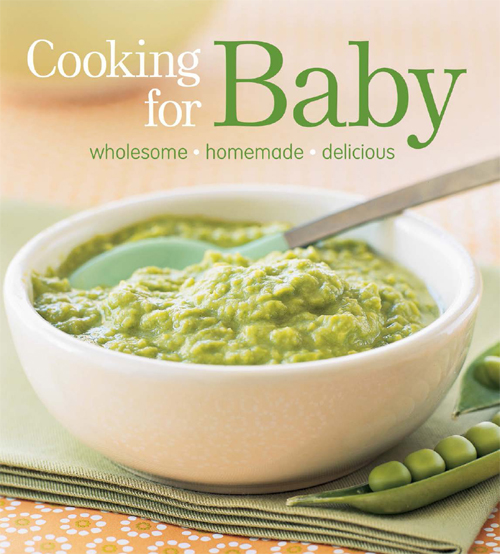
wholesome homemade delicious
Recipes by Lisa Barnes
Photographs by Tucker + Hossler
Weldon Owen



introducing solids
Beginning solid foods is one of the great milestones of the first year of life. It is one of those subjects that everyone has an opinion about, along with whether your childs feet are cold without socks or whether she ought to be crawling by now.
Theres No Rush
Just a generation or two ago, babies were commonly started on solid food at the tender age of 6 weeks. The advice has changed, and most experts now recommend exclusive breast-feeding (or formula feeding) for the first several months. The feeding of solids should wait until baby is 6 months old. Foods may be offered a little sooner, at 4 months, but earlier introduction of food has been linked to allergies, diabetes, and obesity.
Parents often worry that baby needs more to eat than just milk or formula before the age of 6 months, and a baby going through a growth spurt can certainly seem ravenous. But babies can usually thrive for about this long on a liquid diet alone. In fact, breast milk or formula should make up the major part of a childs diet until her first birthday. Until then, rather than supplying babys primary source of nutrition, feeding solids is a way for parents to let their baby explore a world of new tastes, textures, and temperatures, practice the skills of eating, and to learn to enjoy and appreciate the social aspects of mealtime.
Follow Babys Cues
The best way to tell whether your baby is ready to start solids is to watch for cues. Here are some signals that show the time is right to begin offering food:
Your baby is able to sit up well on her own, without your assistance.
Your baby is able to turn her head away to refuse the food you are offering.
Your baby develops a persistent pattern of remaining hungry after the usual feeding.
Your baby stares at you when you eat or grabs for your food.
Your baby can swallow pureed food, rather than reflexively spitting it out.
Ages & Stages
The recipes in this cookbook are divided into chapters by ages that correspond to general patterns of development. Keep in mind that every baby develops differently, and that you and your pediatrician are the best judges of what foods your baby should be eating, and when. If you have any special health concerns, such as allergies, discuss these issues with a health professional and be guided by his or her advice.

wholesome & homemade
Do you eat a lot of jarred, canned, or processed food? If the answer is no, then why should your baby? The foods you give your baby now, in the earliest months, will help shape your childs taste for many years to come.
If you feed your baby only bland, processed jarred baby food and cereal, your baby will become accustomed to bland, processed food. On the other hand, if you feed your baby a variety of fresh fruits, vegetables, grains, and meats flavored with herbs and spices, you are priming his palate for a lifetime of healthful eating habits and culinary enjoyment. The benefits of making baby food at home are numerous:
Its unadulterated You know exactly what goes into the food you make; there arent any preservatives or fillers.
Its more versatile Homemade puree can be diluted with breast milk, formula, or vegetable-cooking water for extra nutrition. As your baby grows, you can make his food just as thick and chunky as he can handle, helping his eating skills progress naturally.
Its more varied Not every vegetable, fruit, grain, or meat is available in the form of store-bought baby food. But you can cook and puree any food you and baby like.
Its more nutritious Jarred baby food is heated to extremely high temperatures during processing, which destroys certain heat-sensitive vitamins more thoroughly than ordinary cooking does.
Of course, prepared baby food is a convenience and might play a role in any family pantry. But for parents who enjoy cooking and eating good meals, there is no reason not to include baby and start exposing him to the kinds of foods he will soon eat along with the rest of the family.
Making homemade baby food does require time and energy, both in short supply when you have a new infant. But by cooking in batches and , you can make homemade baby food nearly as convenient as jarred.
Organic Living
To reduce your babys exposure to toxins, choose organic ingredients for baby food whenever possible. It is especially important to purchase organic thin-skinned fruits and vegetables, such as apples or potatoes, since these absorb pesticides more readily than other produce. It is also wise to buy organic versions of fatty foods, such as meats, dairy, and oils. Pesticides and other environmental toxins tend to be stored in fat cells.

start simple
At 6 months, your babys digestive system is still new. The first foods you offer should be the most mild and digestible ones.
Introducing solids to your baby is a slow process of building a repertoire. With each new food you offer baby, you are shaping her taste and testing her tolerance. Some foods might not agree with her, causing a rash, gas, constipation, diarrhea, or vomiting. For this reason, new foods should be introduced one at a time. If a food doesnt agree with your baby, it might take a day or two for this to become apparent. So when you introduce a new food, feed it to your baby for at least 3 days before you introduce another new food. If your baby or family has allergic tendencies, you can extend this testing period to 5 or 7 days. This gradual approach to introducing new foods makes it easier to identify the culprit if there is any problem.
First Tastes
These foods are digestible and nutritious, and usually agree with babies:
rice
millet
barley
sweet potato & yam
pumpkin & squash
potato
cooked apple
cooked pear
avocado
banana
Gassy Foods
If your baby suffers from gassiness or colic, these foods might worsen the problem:
beans
peas
lentils
broccoli
cabbage
cauliflower
cows milk
cucumber
onion
Allergenic Foods
Many foods can be allergenic, but the majority of bad reactions are caused by a handful of foods:
cows milk
egg white
fish
shellfish
nuts
peanuts
soy
strawberry
wheat

preparing baby food

